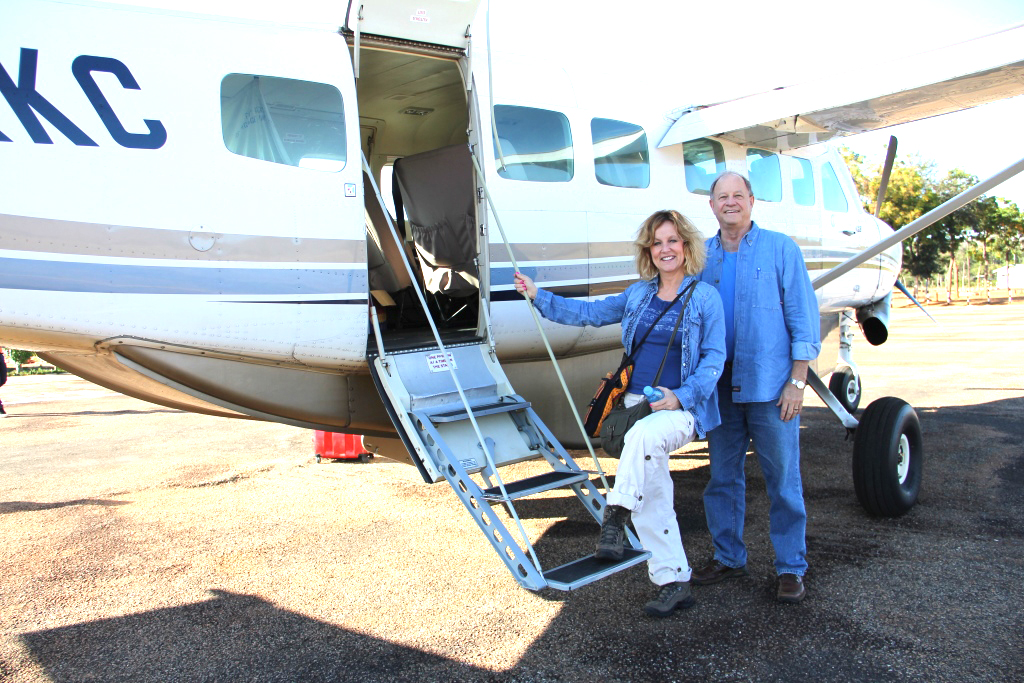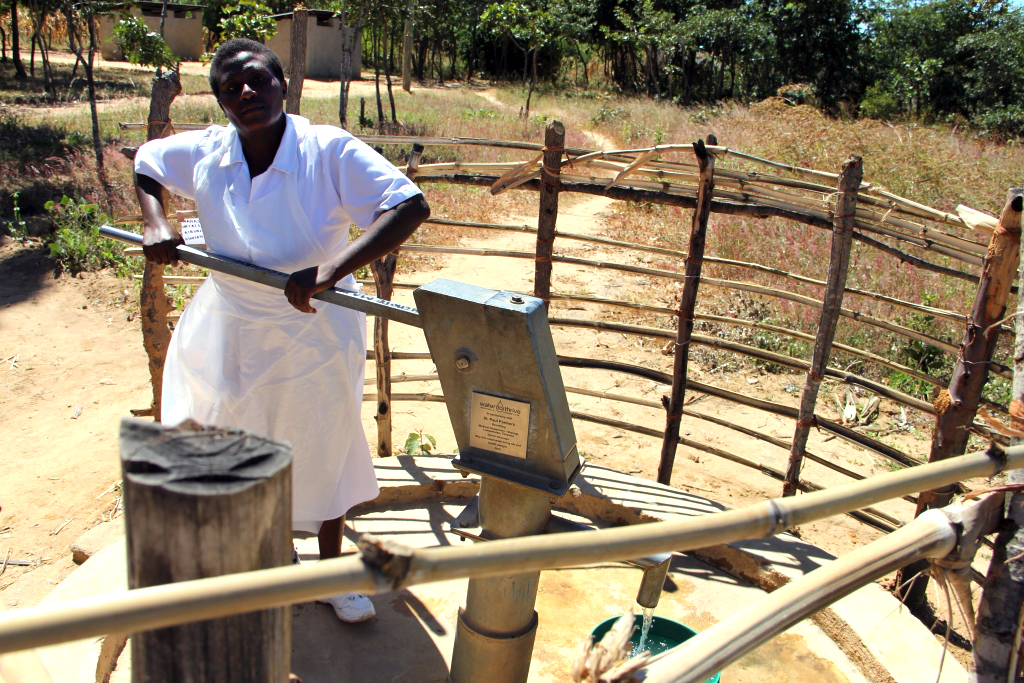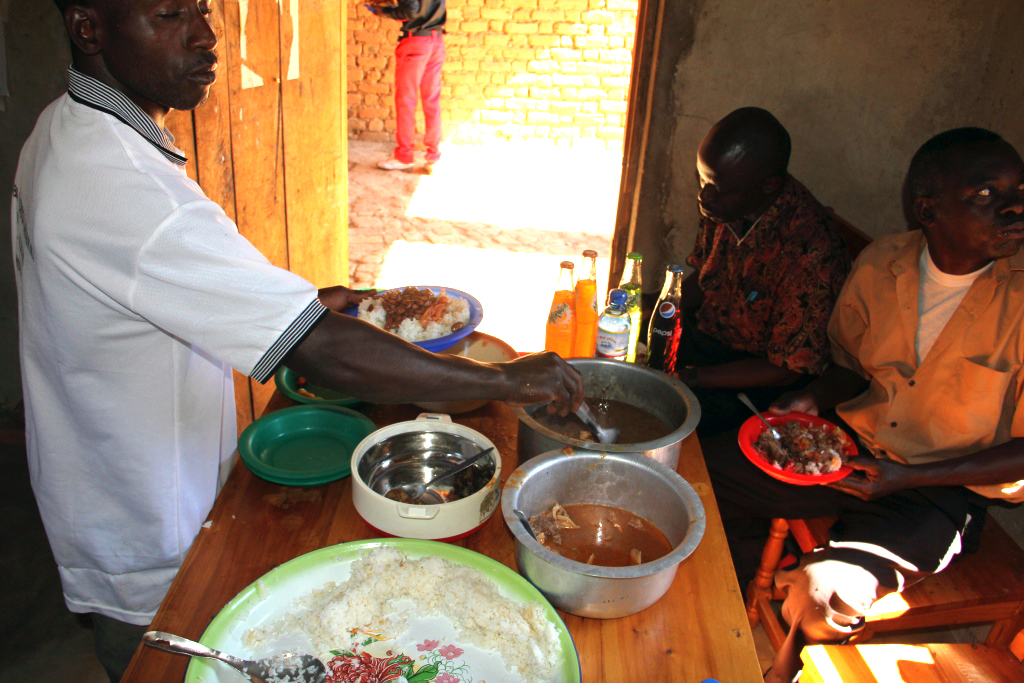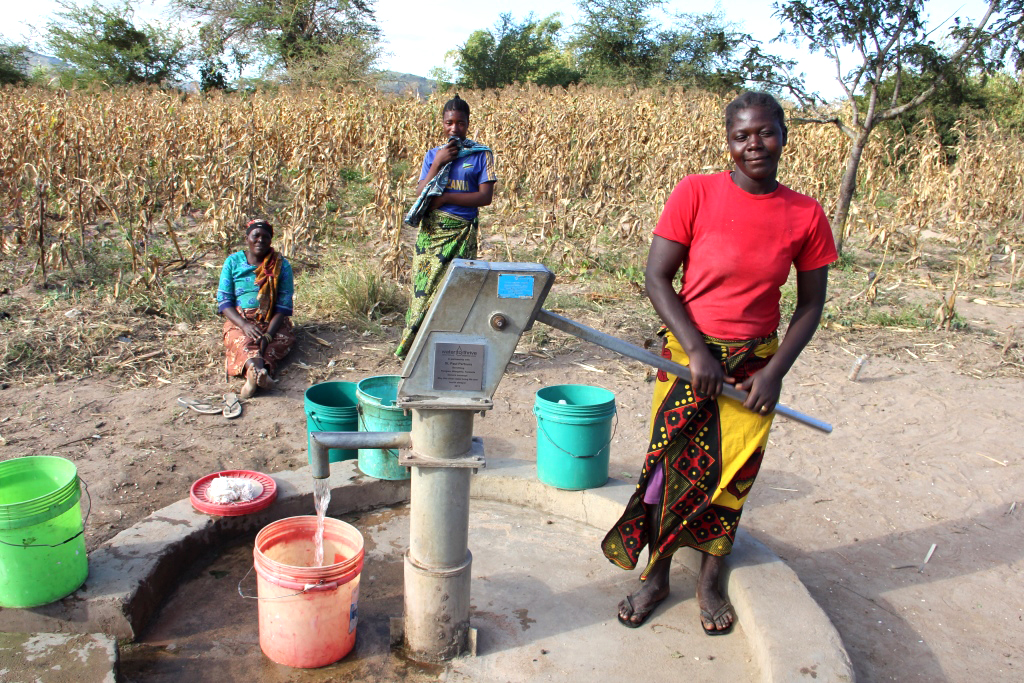
We began our day at 7 a.m., with an early morning flight departing from Dar es Salaam to Iringa. Auric Air has started this route in the last year, which is really great news. It save us one full day’s drive on some not so great roads. This way, we arrive in Iringa by 8:30 and can spend the remainder of the day being productive visiting communities and projects.

Susanne and Dick, just after landing in Iringa.
Our plane was a 12-passenger Cessna … very cozy. We sat right behind the pilot, so we could see all the action. When the pilot crawled into his seat, Susanne leaned over and said, “He looks like he is 12 years old. Should we ask for his license?” He did a great job of getting us to our destination, but we didn’t think he had started shaving yet!
Our implementing partner in Tanzania is St. Paul Partners. We have been doing projects with them for some time now and have 18 completed water projects in this area. The projects, which were completed in 2013-14, are organized by village and sub-villages. For example, our first stop is Lundamatwe Village, and it is comprised of 3 sub-villages, each of which has a completed W2T well.

Adila is a dispensary nurse in Lundamatwe.
In Lundamatwe, our first project to visit is the health post/dispensary. The well is really convenient, located just 50 yards from the back door. When we arrived, we met Adila, the nurse at the health post, who was gathering water to use in dispensary. She said she gathers the water several time a day to use in preparing bed linens and washing and treating patients. In the mornings and evenings, this water project is also shared with the community.
After visiting our projects in Lundamatwe, we head to Wangama Village, a short 30-minute drive. This village has six sub-villages, four of which are assigned W2T water projects.

A fine lunch shared with us in Wangama.
The water committee in Wangama has 12 members (six women and six men), two from each sub-village. The committee is very active and doing a fine job. They have a nice bank balance in the maintenance fund and they collect a monthly fee from each adult using the projects. They were very gracious and excited to have us visit, showing their hospitality by preparing lunch of beef, chicken, rice, pinto beans, and pickled vegetables.

Villager Nabuha and her family.
At our last project of the day, we meet Nabuha, pictured above, gathering water for her family. She is 19 years old, with a four-year-old daughter. She lives a short five-minute walk from the pump. Before the project was completed, she walked more than an hour to fetch water from an untreated river that flows nearby.
When we arrived back in Iringa town, we finished the day with a dinner and discussion with three officials from the local Rotary Club. W2T is in the midst of a 34-project implementation in conjunction with the Eden Prairie MN Rotary Club. Through the work of that Rotary Club, we were able to secure a 3-to-1 match for the money we contributed. We will be making contact with the local Rotary Clubs in each town we visit to have a dialogue about possible collaboration with W2T to help sponsor projects in their local area.
We began our day at 7 a.m., with an early morning flight departing from Dar es Salaam to Iringa. Auric Air has started this route in the last year, which is really great news. It save us one full day’s drive on some not so great roads. This way, we arrive in Iringa by 8:30 and can spend the remainder of the day being productive visiting communities and projects.

Susanne and Dick, just after landing in Iringa.
Our plane was a 12-passenger Cessna … very cozy. We sat right behind the pilot, so we could see all the action. When the pilot crawled into his seat, Susanne leaned over and said, “He looks like he is 12 years old. Should we ask for his license?” He did a great job of getting us to our destination, but we didn’t think he had started shaving yet!
Our implementing partner in Tanzania is St. Paul Partners. We have been doing projects with them for some time now and have 18 completed water projects in this area. The projects, which were completed in 2013-14, are organized by village and sub-villages. For example, our first stop is Lundamatwe Village, and it is comprised of 3 sub-villages, each of which has a completed W2T well.

Adila is a dispensary nurse in Lundamatwe.
In Lundamatwe, our first project to visit is the health post/dispensary. The well is really convenient, located just 50 yards from the back door. When we arrived, we met Adila, the nurse at the health post, who was gathering water to use in dispensary. She said she gathers the water several time a day to use in preparing bed linens and washing and treating patients. In the mornings and evenings, this water project is also shared with the community.
After visiting our projects in Lundamatwe, we head to Wangama Village, a short 30-minute drive. This village has six sub-villages, four of which are assigned W2T water projects.

A fine lunch shared with us in Wangama.
The water committee in Wangama has 12 members (six women and six men), two from each sub-village. The committee is very active and doing a fine job. They have a nice bank balance in the maintenance fund and they collect a monthly fee from each adult using the projects. They were very gracious and excited to have us visit, showing their hospitality by preparing lunch of beef, chicken, rice, pinto beans, and pickled vegetables.

Villager Nabuha and her family.
At our last project of the day, we meet Nabuha, pictured above, gathering water for her family. She is 19 years old, with a four-year-old daughter. She lives a short five-minute walk from the pump. Before the project was completed, she walked more than an hour to fetch water from an untreated river that flows nearby.
When we arrived back in Iringa town, we finished the day with a dinner and discussion with three officials from the local Rotary Club. W2T is in the midst of a 34-project implementation in conjunction with the Eden Prairie MN Rotary Club. Through the work of that Rotary Club, we were able to secure a 3-to-1 match for the money we contributed. We will be making contact with the local Rotary Clubs in each town we visit to have a dialogue about possible collaboration with W2T to help sponsor projects in their local area.

About The Author: Water to Thrive
More posts by Water to Thrive